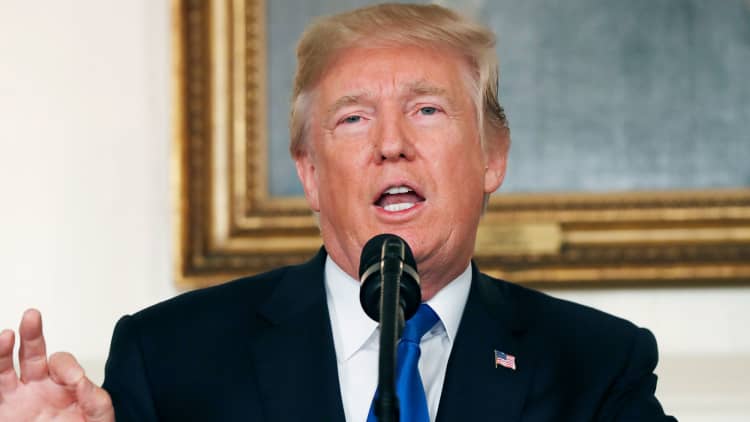President Donald Trump has multiple opportunities to scrap the Iran nuclear agreement in the coming days, and the energy market will be watching for signs that his patience with an accord he calls the "worst deal ever" is wearing thin.
That 2015 deal — President Barack Obama's signature foreign policy achievement — lifted crippling sanctions against Iran in exchange for the regime accepting limits on its nuclear program and allowing international inspectors into the country.
But the deal's structure has made it something of a recurring ticking time bomb in the age of Trump. The sitting U.S. president has to agree to suspend sanctions every 120 to 180 days.
The prognosis for the Iranian nuclear deal in 2018 also looks fairly bleak, and the persistent threat of a U.S. sanctions snapback could curtail foreign investment in the Iranian energy sector and imperil output expansion plans.Helima CroftRBC Capital Markets global head of commodity strategy
Starting Friday, Trump faces several deadlines to suspend key sanctions against Iran. He reluctantly waived sanctions last summer, but this is the first time he'll have to do so since telling Congress in October that the nuclear deal is no longer in the country's national security interest.
Meanwhile, Congress has not delivered legislation to modify the deal that some lawmakers hoped would be ready by now. That puts the president in the position of having to extend sanctions relief to Iran under the terms of a deal he disavowed three months ago.
If Trump refuses to waive the sanctions, it could trigger the collapse of the nuclear deal and put the United States on a diplomatic collision course with France, Germany, China, Russia and the U.K., which also negotiated the accord. It could also disrupt oil supplies from Iran, OPEC's third-largest producer, and potentially free the regime to pursue a nuclear weapon.
The administration expects to announce on Friday whether it will continue suspending sanctions. Trump has not yet made a final decision, a National Security Council spokesperson told CNBC.
'Bleak' prospects for nuclear deal this year
Several analysts say Trump is likely to keep the deal alive this week, but the outlook for the accord remains murky beyond this month.

"The prognosis for the Iranian nuclear deal in 2018 also looks fairly bleak, and the persistent threat of a U.S. sanctions snapback could curtail foreign investment in the Iranian energy sector and imperil output expansion plans," Helima Croft, global head of commodity strategy at RBC Capital Markets, said in a recent research note.
Croft lists a potential collapse of the deal as a key risk to oil markets this year. Since sanctions were lifted in 2016, Iran's oil output has risen by about 1 million barrels per day to about 3.8 million bpd. The loss of Iranian exports would likely push up oil prices.
Refusing to grant the waivers is Trump's most direct path to blowing up the deal. It would reimpose far-reaching sanctions that could hobble Iran's energy industry, sever it from the international financial system and put a chill on foreign investment into the country.
Risk consultancy Eurasia Group gives the deal a 55 percent chance of surviving Trump's first term but says it's safe for now. The firm believes Trump will issue the waivers this week but will once again refuse to certify the deal to Congress, which he must do every 90 days under U.S. law. The next deadline for certification is also this week.
Trump's rejection of the deal in October opened a 60-day window for Congress to restore sanctions under a 2015 law. Rather than take that road, lawmakers began to work on legislation that would address parts of the deal the Trump administration opposes.
Ball in Senate's court
That effort by Congress is the main reason Trump won't kill the deal, according to Eurasia Group. The campaign is being led by Sens. Bob Corker, R-Tenn., and Ben Cardin, D-Md., the top lawmakers on the Senate Foreign Relations Committee, as well as Republican Iran hawk Sen. Tom Cotton of Arkansas.
"Over the next few months, this bill has a decent chance, even though getting Cotton and Cardin together on anything will be tough," Eurasia Group Chairman Cliff Kupchan said in a briefing.
Right now, the plan has not advanced much beyond the framework Corker introduced in October. Corker confirmed last week that no legislation is imminent.
It's also uncertain Democrats will accept a pillar of Corker's outline: making the Iran nuclear deal essentially permanent. That would be unacceptable to Iran and faces significant opposition from the other parties to the deal.

Republicans are opposed to the deal in part because the limits that it places on Iran's uranium enrichment and access to equipment are scheduled to expire. Corker's outline calls for eliminating these so-called "sunset provisions" and automatically restoring sanctions if Iran comes within one year of being able to make a nuclear weapon.
Richard Nephew, the lead sanctions expert for the U.S. team that negotiated the nuclear deal, also believes Trump will waive the sanctions this week, but says it's possible he will give senators a deadline, perhaps until the end of the year, to deliver a legislative option.
"From a market perspective, such a redline would continue to chill investment in Iran and reduce Iran's incentive to continue to abide by the terms of the" deal, he said in a briefing for Columbia University's Center on Global Energy Policy, where he is now a senior research scholar.
"There may be energy market implications, though probably not in terms of immediate Iranian oil and gas supply," he said.


